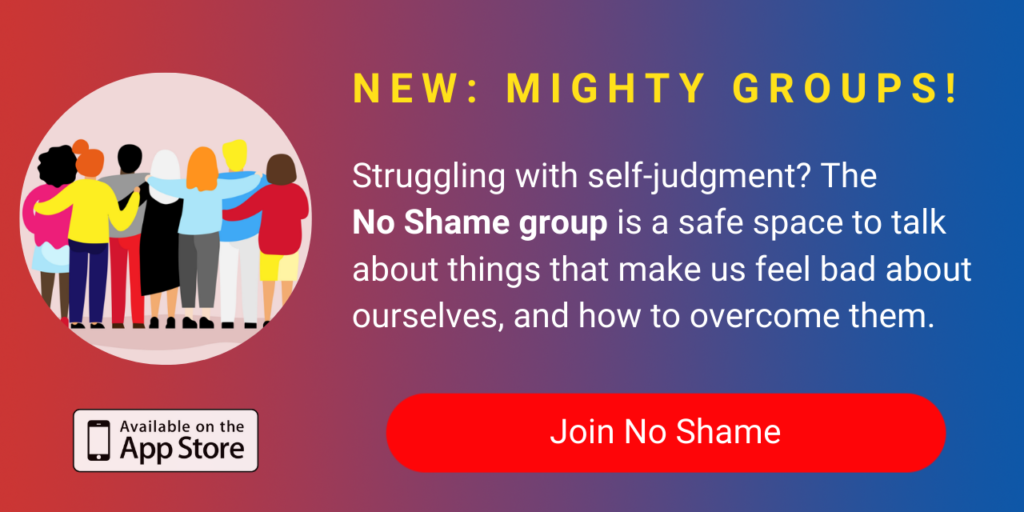How Lying About My Mental Health Fed My Shame
Editor's Note
If you struggle with self-harm or experience suicidal thoughts, the following post could be potentially triggering. You can contact the Crisis Text Line by texting “START” to 741741. For a list of ways to cope with self-harm urges, visit this resource.
Whether we like it or even realize it, we have a relationship with our own mental health, which very much intertwines with how we view ourselves.
It’s a complex relationship that can either be healthy or unhealthily like any other, and there are certain behaviors that drive this in either direction. For me, I wasn’t aware of this relationship and the damage I was causing it for many years.
I was diagnosed with depression 20 years ago and, without the proper support from a therapist, I was given my first lot of antidepressants and walked out the door. I had no idea what was happening. I was beyond confused about why I felt so terrible and the thoughts racing through my mind terrified me. Only my closest friends and my family knew but I felt full of shame and confusion because I didn’t even understand what depression was. I started taking time off work, and so began the lies that would go on for the next 15 years.
“I have a migraine;” “I was sick all night;” “I have stomach bug;” I could go on and on and on. By the time my mental health had worsened into what would later be diagnosed as borderline personality disorder (BPD), major depressive disorder (MDD) and generalized anxiety disorder (GAD), I had mastered lying and built a wall around me to protect me from anyone thinking less of me for taking time off work for mental health reasons. In my mind, the higher and stronger the wall the better, but it came at an enormous cost. It was exhausting to keep up with the lies and my only savior was that I was very successful at my job. Again, I formed a plan: the better I performed at work, the less likely they would question my sick leave. But as usual, it was completely depleting all of my resources to maintain the façade.
2010 was a turning point in my life and probably one of the hardest years for me. It was the first time I self-harmed, which was explained away by a ridiculous story about a clumsy accident. I was admitted to the psych ward right before Christmas, but thankfully covered that by taking holiday leave. At the start of 2011, I found the psychiatrist I would work with for the next eight years.
The lies started to get used in more frequent situations. I felt so ashamed that I would lie to friends about why I couldn’t do things and why I couldn’t go to work functions anymore. It was one thing to call in sick to work with a lie, but lying to my friends left me feeling more anxious and depressed than ever. My leader at work knew about my psychiatrist appointment, but at 11 a.m. every Friday, I had to get up and lie that I was going to a meeting and would be out of the office. I know everyone was wondering what the meeting was that only I went to every week. Sometimes, people would ask and I would cover it over with “oh, it’s just a boring meeting, I won’t be long.”
What was once a wall of defense over time turned into a wall of shame. I started to realize that every time I told a lie, I was effectively reinforcing the shame against myself. Once I had my full diagnosis, I went into full-blown research mode. I decided to take control back by learning as much as I could about the conditions that I had. Borderline personality disorder was something I wanted to learn inside and out. I realized at that moment that whilst I thought I was protecting myself by not allowing others to judge me, I was, in fact, judging myself every single time. It was feeding into an unhealthy relationship with my mental health.
It can be true that you can have a healthy relationship with your own mental health and still have periods of being unwell. Having a healthy relationship means understanding your own behaviors toward yourself and how and why they happen. It takes work because for me, those unhealthy behaviors were very much ingrained and had been in action for many years. Part of pulling the wall down was sheer exhaustion and part was a newfound sense of dignity and knowledge.
Why should I lie about something that isn’t my fault? Why should I lie when there are times when things are just too difficult? I talk all the time about wanting to reduce the stigma of mental health yet I was perpetuating it myself, against myself. If I want change, I have to be the change I want to see in the world, which means I have to be honest. When I started writing my blog, I decided to hold nothing back. I knew some of the content would shock people because they had no idea what was happening. The lesson I learned is that I didn’t give those people a chance to support me by being honest about what was going on.
It now feels liberating to be honest about my mental health which I never thought was possible. Instead of fostering an unhealthy relationship, I have a more balanced and healthy relationship with my mental health. Sure, I resent it at times — I am still human — but if I can’t do something because I am not feeling well, then I’m honest about it. I still have a little trouble proactively asking for help, but I am getting there on that front too. But the wall is finally down.
Photo by Kyle Glenn on Unsplash


